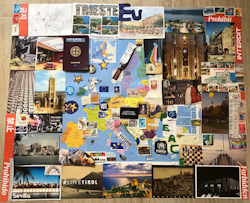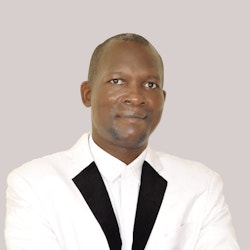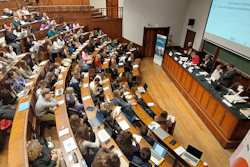Sustainability and Climate Protection: Joshua Ibanda, University of Edinburgh
A master’s student at the University of Edinburgh, Joshua was excited to engage in sustainability topics in his Student Award entry as his current study programme has a special focus on sustainability. The jury were particularly impressed by Joshua’s holistic approach to representing sustainability through art, connecting not only with the UN’s Sustainable Development Goals (SDGs) but also aspects of diversity and inclusion and the relationship between form and meaning in art.

By Joshua Ibanda, University of Edinburgh
Joshua explains the symbolism behind his artwork:
"The idea behind my artwork is a sustainable futurism linked to the SDGs. I draw from the primary theme of sustainability to reimagine the University of the Future.
I have utilised eleven iconic pots to symbolise the Una Europa universities as a starting point for reimagining the University of the Future. The pots, which symbolise oldest forms of sustainable science and technology, are tilted at an angle; this allows water from the pots to pour into the sea of knowledge which is at the bottom of the picture.
The pouring symbolises community outreach, global partnerships, and inclusivity. The tilting of the pots symbolises the idea that academics at the University of the Future should be challenged at all times. This will motivate academics to 'pour the water'. I hope that academics at the University of the Future should nurture and instil a culture of tilting learners’ minds to become more innovative. This will allow students to look for sustainable solutions to solve wicked sustainability challenges and climate disasters.
Fish are depicted in the bottom right, representing aquatic life and other lifeforms which depend on clean water including man. A red sun symbolises the University of the Future as a place of universality and diversity. The sky/clouds, colour green and plant species represent a perfect ecosystem which is key to sustainable climate mitigation. A larger part of the picture has been executed using natural colours, evoking sustainability. The choice of the medium of art is symbolic to universality of fine art."
" I feel very much humbled by the fact that I was selected as one of the winners of the Una Europa Student Award 2024. It is such an honour for me to be part of the Student Congress in Berlin. The most exciting thing about Una Europa for students is the fact that it brings together students from different corners of the universe under the alliance of eleven world class universities. "
Joshua Ibanda, University of Edinburgh
Diversity and Inclusion: Henar Maíllo Valdés, Universidad Complutense de Madrid
Henar addresses underrepresentation of women in academia through a spoken word poem in her submission, a thought-provoking mediation on the tension between the student body, of which women often make up the majority, and the male-dominated syllabus taught to them. The poem resonated with the jury on multiple levels, commending Henar for offering an "impressive structural approach to critically assessing academia" while also creating a beautiful work of art.
Reflecting on her spoken word, Henar says:
"Women represent the majority of the students and barely appear on the syllabus. We've grown so used to seeing history as the great achievements of men that we take the history of men as the history of humanity. Over my years of school, I have undoubtedly seen an improvement. We've changed from no women in textbooks to including them in a final section; you had key figures and women who were also great. We were usually told not to study the second as they weren't that important; it was just extra information. This was the improvement we celebrated. While being the one bringing up the gender lens for years, I didn't realise it was even possible for a class to do it as well.
This spoken word poem is about the first time women were some of the authors we read. This year, in one class, we studied their voices and perspectives, not even on topics of gender, simply as another author. I hope one day, it's not a surprise to find diversity and look up to people who look like you (being women or other minorized groups who are even more forgotten), but for now, I know I'll always remember this professor. It's been a century since women are included in classrooms, now we need to see ourselves in books. That's the University of the Future for me."
Research and Innovation: Giovanni Coluccello, Alma Mater Studiorum – Università di Bologna
Giovanni’s creative approach to exploring the relationship between research, innovation, mobility and identity really resonated with the jury, who were pleasantly surprised by the originality of themes explored and the ambition to "go beyond the obvious".

By Giovanni Coluccello, Alma Mater Studiorum – Università di Bologna
Delve into Giovanni’s artwork, guided by his own words:
"In this art installation, I attempt to approach the concept of Europe and the University of the Future by combining an amalgamation of diverse elements of the ‘Old World’, as Columbus described our continent while sailing away, with pieces of its reimagining.
My collage merges the Old and the New, tracing back pieces of history, of the different narratives defining what it means to be European.
By including symbols representing the diversity of ‘European' languages, cultures and land (with postcards from Sevilla to Tirol) and the political map of Europe as a background, I attempt to highlight how borders still influence our lives but also how far we have come, epitomised by the passport (my real passport) that carries not a national but a European flag and the phrase ‘Free to Move’ hiding my country of origin – an obsolete concept in our New World.
Small details worth highlighting are the Dutch Indies stamp and the LGBTQ+ and EU flags to represent the inclusion of ALL identities, which are in principle empowered but so often ignored and not studied enough (or ‘forbidden’, as the red pieces read).
The postcards symbolise the exchange of ideas and cultural diversity, each one a unique perspective that contributes to a collective understanding.
The dried flowers signify the importance of sustainability and the preservation of knowledge, while reminding us that innovation should always align with the interests of our planet.
The stamps, most of them Europa editions, represent historical and cultural connections, faded footprints of our shared past.
Each fragment of my modern mosaic hopes to incentivise new lines of research, creating a (Universe)ity where all these elements come together.
And thus, as a novel Columbus, we, the University of the Future, we'll follow the light of this new dawn, into a greener, more diverse, more resilient future."
Mobility: Kiira Sarasjärvi, Helsingin yliopisto/Helsingfors universitet
Meditating on what mobility could look like in the University of the Future, Kiira developed the Una Europa Research Career Simulator – a virtual space for researchers across the alliance to connect, collaborate and co-create. The jury praised Kiira’s proposal for prioritising inclusivity and interdisciplinarity, bringing students and young researchers together across countries, cultures and disciplines.
Learn more about Kiira’s Research Career Simulator:
"The Una Europa Research Career Simulator is an online platform that will connect students from different backgrounds and allow them to work together in the inter-university environment, shaping the universities of the future. The platform allows students across Europe and worldwide to connect and practice their research skills in a safe environment. This will help them to create meaningful professional relationships with their peers without the need to move abroad, since not everyone has this opportunity.
Each student will have their own profile stating their university, study field, and degree. The platform can then be used to connect with other Una Europe universities across Europe. Via this platform, students can share knowledge about their studies or seek mentorship. This platform can also be used to post different competitions, projects and online courses. Projects can be scaled up or down across the study fields and specialties. For example, imagine a competition or an online course where students are simulating large-scale collaborative research projects, such Horizon Europe or ERC funding. Student can try out different roles: PhD students as post-docs, master’s students as PhD, and bachelor’s as master’s students.
The idea is to provide students with a practice platform. The Research Career Simulator will boost student’s confidence and build their international research careers. This will help them navigate through the complex research world so they will be ready to make their research contributions in the future. Let's connect students across Europe and the globe!"
" I actually found out about the Una Europa Student Award by accident. As a PhD researcher who has spent several years abroad, I wanted to create something that could have a broader impact on supporting undergraduate and postgraduate students to advance their future careers in academia. "
Kiira Sarasjärvi, Helsingin yliopisto/Helsingfors universitet
Teaching and Learning: Christina Kalogeropoulou, Université Paris 1 Pantheón-Sorbonne
Christina crafted a poetic letter to a future student for her winning submission, taking inspiration from the music of Franz Schubert to encourage learners to shape their own educational experience and add their voice to the polyphony of our universities. The jury highlighted Christina’s talent in weaving several important teaching and learning themes into her submission and innovative use of format, which they describe as "itself a joyous manifestation of interdisciplinarity".

Christina Kalogeropoulou, Université Paris 1 Pantheón-Sorbonne
Christina describes her poem:
"With Les arpèges de l'avenir (The arpeggios of the future) I aimed to create a poetic exploration of the evolving landscape of higher education, inspired by learning theories, philosophical reflections, and practical aspirations for future students. A mélange of poetry and prose. We hear someone reciting the poem while internally analysing and speaking to a future student about their wishes. We can hear the voices of students or teachers reciting the poem or the letter, interchangeably.
By incorporating Franz Schubert’s Sonata D. 821 Arpeggione, we commence a more direct connection with music. Just as musical notes connect to form creating a harmonious piece, knowledge connects us all in harmony, often without us realising it. Reading any part aloud, either individually or together, synchronises us, allowing us to share breaths and follow the same rhythm without needing a conductor to count the milliseconds. Central to the poem is phenomenology’s concept that knowledge is actively created through engagement and personal perspective. This foundational idea is woven throughout the verses, emphasising that learning is not a passive reception but an interactive process. The poem encourages future students to embrace their role as active participants, whose voices and experiences enrich the educational experience.
Ultimately, Les arpèges de l'avenir is a call to embrace a collaborative and integrative approach to education, fostering a vibrant and dynamic academic environment where dreams and knowledge flow harmoniously."
Global engagement: Kateryna Fadieieva, Uniwersytet Jagielloński w Krakowie
A student of International Relations and Area Studies, Kateryna Fadeiva drew on her academic knowledge to address the topic of global engagement in the context of the University of the Future. Her proposal for boosting students’ intercultural competences and ability to address the complexities of our increasing interconnected world is the Global Nexus Campus. Described by the jury as a "transformative educational experience", Kateryna’s winning idea places particular emphasis on accessibility when it comes to connecting people and exchanging ideas.
Kateryna introduces the Global Nexus Campus:
"The scenario imagines a futuristic university, the Global Nexus Campus, where traditional barriers to global collaboration are dismantled. Through innovative initiatives such as virtual reality immersion, cultural exchange programs, and interdisciplinary innovation hubs, students from around the world engage in a transformative educational experience. The vision is one of a vibrant, interconnected community of global citizens equipped to address the complex challenges of our interconnected world."
" "As a student who relates deeply to the challenges discussed, I was inspired to submit an entry to the Student Award because I wanted to address issues that resonate with my own experiences and those of my peers. It concerns me." "
Kateryna Fadieieva, Uniwersytet Jagielloński w Krakowie
What happens next?
Next week our awardees will travel to Berlin to present their winning ideas to students across our alliance and beyond at the Una Europa Student Congress, this year hosted by Freie Universität Berlin.
Congratulations to our winners and thank you to all entrants for sharing their vision for a reimagined University of the Future!

The Una Europa Student Award is part of our activities to empower students across Una Europa, initiated under the Una.Futura project.






